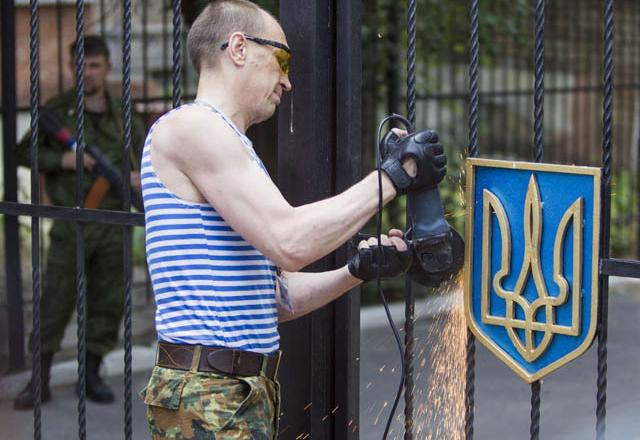You are here
Ukraine tells Russia to recognise new president
By AFP - May 31,2014 - Last updated at May 31,2014
KIEV — Ukraine accused Russia on Saturday of unleashing a mass propaganda campaign to persuade global powers not to recognise an election that gave the presidency to a pro-Western tycoon.
The United States for its part acknowledged a “fundamental disagreement” with Russia and said President Barack Obama would extend his support to Petro Poroshenko when he meets the winner of the May 25 ballot in Warsaw on Wednesday.
The months-long fight for the future of the ex-Soviet state — splintered between a more nationalist west and a heavily Russified southeast — has killed more than 300 people and resurrected the geopolitical barriers of the Cold War.
Ukraine’s separatist insurgency only intensified after 48-year-old chocolate maker Poroshenko won 54.7 per cent of a poll that was disrupted across swathes of the eastern rust belt.
Government forces reported suffering no casualties on Saturday while repelling two rebel attempts to recapture an airport in the eastern hub of Donetsk the insurgents seized a day after the election at the cost of 40 fighters — most of them Russian nationals.
A Donetsk separatist leader denied staging any attack and said six of his men were killed when they tried to retrieve the bodies of those slain in the original airport raid.
Ukraine’s acting foreign minister said Russia was now using every means at its disposal to unsettle the new Kiev leaders and regain control over its historic domain.
“Five days since elections, there has been no official recognition yet. Obviously, the Russian Federation doesn’t have legal grounds to question the election’s legitimacy,” Andriy Deshchytsya wrote in an opinion piece published in Saturday’s edition of the English-language Kyiv Post.
“The massive... information campaign Kremlin has launched these days, with an avalanche of doubletalk and fake news, signals one thing — this is Russia’s last chance to try shifting the balance of international public opinion,” he wrote.
‘Fundamental disagreement’
Russia on Friday accused Ukraine of breaching the 1949 Geneva Conventions protecting civilians in wartime by killing peaceful citizens during its seven-week “anti-terrorist operation” in the industrial regions of Lugansk and Donetsk.
And a furious information campaign by Moscow media portrays Kiev protesters as “fascists” and accuses the army of waging a “punitive operation” — the term once used to portray Nazi atrocities during World War II.
But Washington praised Ukraine for showing utmost “restraint” and accused the pro-Russian militias of “murder, kidnapping and looting”.
“We have a fundamental disagreement with the Russians about what the Ukrainian government is doing and the validity of their own right to maintain calm and order in their own country,” US State Department spokeswoman Jen Psaki said.
US Secretary of State John Kerry on Friday expressed alarm over the sudden emergence of fighters from Russia’s war-ravaged region of Chechnya among the insurgents.
Psaki told reporters that “we do feel that there’s a Russian hand involved” in the Chechen gunmen’s entry into the fray.
But Chechnya’s Kremlin-backed leader Ramzan Kadyrov said such charges were “absolutely untrue”.
“There are only 14 Chechens there, by our count,” Kadyrov told Russian state television.
Russian President Vladimir Putin — keen on seeing Ukraine join a post-Soviet economic union that includes only Belarus and Kazakhstan — promised to “respect” the will of Ukrainian voters but is yet to congratulate Poroshenko on his win.
Neither has he accepted Poroshenko’s invitation to hold the first meeting between the two neighbours’ since the February uprising at D-Day commemorations in Normandy on June 6.
But Washington said Russia had taken a small step to relieve tensions by pulling back two-thirds of the 40,000 soldiers it had massed at Ukraine’s border since its March seizure of the Crimea peninsula.
“These initial steps are positive, but we would like to see the full withdrawal,” Psaki said.
Missing monitors
The increasingly volatile conflict — growing ever more complex as rivalries emerge among rebel commanders — has ensnared a steadily climbing number of Europeans tasked with helping to resolve a crisis that has shaken the very foundation of Ukraine.
The Organisation for Security and Cooperation in Europe said on Saturday that it had still heard no news from two small international teams detained by gunmen at roadblocks on Monday and Thursday.
The Vienna-based organisation — formed in the 1970s as a forum for dialogue during the Cold War and now a principal player in the worst East-West stand-off since that era — lost contact with a four-member team outside Donetsk on Monday.
Four more European members of the Special Monitoring Mission to Ukraine and their local translator went missing on Thursday about 100 kilometres west of the Russian border in the province of Lugansk.
Related Articles
As the fighting becomes more ferocious in eastern Ukraine, Chechnya’s Moscow-backed leader is denying that he has sent in some of his famously ruthless troops to help the pro-Russia insurgents battling government forces.
Ukraine’s unilateral ceasefire hung in the balance Saturday as clashes spread across the separatist east and Moscow rankled Kiev by putting its central forces on full combat alert.
Ukraine launched delicate dual-track diplomatic negotiations with Russia on Monday aimed at averting a debilitating gas cut and ending a bloody separatist insurgency by the end of the week.


















